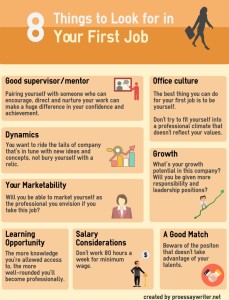Graduations from college and university will take up much of the month of May. Many graduates have lined up summer jobs, or their first full-time job, while others are still searching. Regardless of where you are in your search, it may be helpful to look at the infographic in this post (courtesy of my colleagues at Proessaywriter.net).
Keep in mind a few things:
- As a general rule, employers do not care about you and what you want. They care about how you can help them achieve their goals. So harsh as that may seem, it’s better for you to know and accept that. If it turns out that employers want to woo you by talking about growth potential etc., great. In most cases, that will not happen.
- You can ask questions about things that interest you (compensation, growth potential) AFTER you first explore the job, asking questions about the responsibilities, how your work will contribute to the overall goals of the company, whether there is a strategic plan, who did the job previously and what did they do best, and what (if anything) did the employer change about the job description before posting it.
- Explore things like culture, schedule, and boss with questions like: What’s the culture like here? What does a typical day look like here in the office? How long did the previous position-holder have the job? Where did they go from this job? What kind of training and development do you offer your staff?
- If you are interviewing with the person who will be your boss, pay attention to your feelings and your gut. If you start getting nervous and tense, chances are you won’t do well with this boss. If you feel sick to your stomach, pay attention because it’s probably going to be bad working for this person. We have a secondary brain in our guts – the exact same neurons that are in our brain are in our intestines. So our gut, or “enteric brain” is literally processing information, and giving us feedback.
- While I’d assume you applied for jobs you want using skills you enjoy, double check in the interview to see how much time you’ll actually spend on things you enjoy. Ask about percentage of time spent in each kind of task.
- Remember, any job is a great opportunity to learn about yourself. You’ll learn what you like and don’t like, and can use that information in future job searches. Do a great job wherever you are and, even if you don’t like the job, you’ll get a good reference that will help you get your next gig.




Believe me, this tips for getting your first job will help you. Your first job will always be memorable and it will teach you new skills that you didn’t learn in school.
Thanks for your comment, James! I appreciate it. Best, Julie